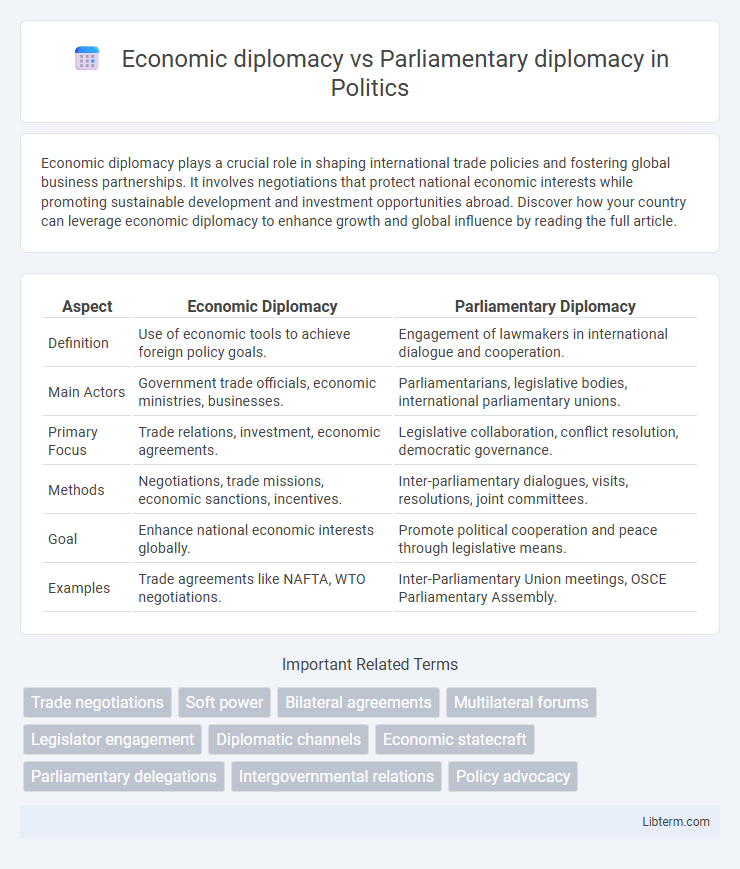Economic diplomacy plays a crucial role in shaping international trade policies and fostering global business partnerships. It involves negotiations that protect national economic interests while promoting sustainable development and investment opportunities abroad. Discover how your country can leverage economic diplomacy to enhance growth and global influence by reading the full article.
Table of Comparison
| Aspect | Economic Diplomacy | Parliamentary Diplomacy |
|---|---|---|
| Definition | Use of economic tools to achieve foreign policy goals. | Engagement of lawmakers in international dialogue and cooperation. |
| Main Actors | Government trade officials, economic ministries, businesses. | Parliamentarians, legislative bodies, international parliamentary unions. |
| Primary Focus | Trade relations, investment, economic agreements. | Legislative collaboration, conflict resolution, democratic governance. |
| Methods | Negotiations, trade missions, economic sanctions, incentives. | Inter-parliamentary dialogues, visits, resolutions, joint committees. |
| Goal | Enhance national economic interests globally. | Promote political cooperation and peace through legislative means. |
| Examples | Trade agreements like NAFTA, WTO negotiations. | Inter-Parliamentary Union meetings, OSCE Parliamentary Assembly. |
Understanding Economic Diplomacy
Economic diplomacy involves the strategic use of a country's economic resources and policies to achieve foreign policy objectives, emphasizing trade promotion, investment attraction, and economic cooperation. It leverages tools such as bilateral trade agreements, foreign direct investment (FDI), and international economic organizations to enhance national economic interests globally. Understanding economic diplomacy requires analyzing its role in shaping global markets, facilitating economic integration, and influencing international economic governance.
Defining Parliamentary Diplomacy
Parliamentary diplomacy refers to the interactions and negotiations conducted by legislators and parliamentary bodies to influence international relations, promote peace, and foster cooperation between countries. It differs from economic diplomacy, which primarily focuses on advancing national economic interests through trade, investment, and financial agreements. Parliamentary diplomacy often involves dialogue, confidence-building measures, and collaboration on global issues such as human rights and security.
Historical Evolution of Diplomatic Practices
Economic diplomacy evolved significantly during the Industrial Revolution as nations prioritized trade agreements and financial alliances to bolster economic growth and global influence. Parliamentary diplomacy emerged more prominently in the 20th century, reflecting democratic governance's role in shaping foreign policy through legislative engagement and international cooperation frameworks. Both practices illustrate shifting diplomatic priorities from state-centric power balances to multifaceted interactions incorporating economic interests and representative institutions.
Key Objectives of Economic Diplomacy
Economic diplomacy primarily aims to promote international trade, attract foreign investment, and foster economic cooperation between countries to enhance national economic growth. Its key objectives include negotiating trade agreements, facilitating market access for domestic industries, and securing favorable economic partnerships. Unlike parliamentary diplomacy, which emphasizes legislative dialogue and political negotiation, economic diplomacy focuses on advancing the economic interests of a country through strategic engagement with global markets and economic stakeholders.
Core Functions of Parliamentary Diplomacy
Parliamentary diplomacy primarily facilitates dialogue, cooperation, and conflict resolution among legislators from different countries, promoting mutual understanding and international peace. It enables the development of transnational networks, influences foreign policy through parliamentary debates and resolutions, and fosters democratic principles globally. Unlike economic diplomacy, which centers on trade negotiations and investment promotion, parliamentary diplomacy emphasizes legislative collaboration and normative consensus-building.
Comparative Analysis: Economic vs Parliamentary Diplomacy
Economic diplomacy centers on advancing national economic interests through trade negotiations, investment promotion, and multinational economic cooperation, leveraging tools like bilateral agreements and international finance institutions. Parliamentary diplomacy involves legislators engaging in dialogue, cooperation, and conflict resolution across borders to influence foreign policy and promote democratic governance, utilizing platforms such as inter-parliamentary unions and international assemblies. The comparative analysis highlights economic diplomacy's focus on state-centric economic objectives and market integration, while parliamentary diplomacy emphasizes legislative collaboration and soft power to foster political consensus and international norms.
Impact on International Relations
Economic diplomacy advances international relations by promoting trade agreements, investment flows, and economic partnerships that strengthen global cooperation and mutual prosperity. Parliamentary diplomacy enhances diplomatic engagement through inter-parliamentary dialogues, legislative collaboration, and conflict resolution initiatives, fostering transparency, trust, and democratic governance between nations. Both forms of diplomacy complement each other by creating multi-layered channels for dialogue that address economic interests alongside political accountability in the international arena.
Case Studies of Economic Diplomacy Success
Economic diplomacy leverages trade agreements, investment promotion, and financial cooperation to enhance national economic interests, exemplified by China's Belt and Road Initiative, which boosted connectivity and trade across Asia, Africa, and Europe. Parliamentary diplomacy, in contrast, emphasizes inter-parliamentary dialogue and legislative collaboration, seen in the European Parliament's role in shaping EU trade policy through consensus-building among member states. Case studies highlight that economic diplomacy directly impacts tangible economic outcomes, while parliamentary diplomacy supports these goals by fostering political stability and cooperation necessary for sustained economic agreements.
Role of International Parliamentary Assemblies
International Parliamentary Assemblies enhance economic diplomacy by facilitating dialogue on trade policies, investment frameworks, and sustainable development goals among member states. These assemblies promote mutual understanding and cooperation through legislative exchange, enabling countries to align economic strategies with diplomatic objectives. By integrating parliamentary insights into global economic discussions, they bridge gaps between national interests and international economic governance.
Future Trends in Global Diplomacy
Economic diplomacy is increasingly driven by digital trade agreements and sustainable investment frameworks, shaping future global economic cooperation. Parliamentary diplomacy is evolving through enhanced inter-parliamentary networks and virtual assemblies, promoting transparency and legislative dialogue. Future trends reveal a convergence where economic priorities and legislative collaboration jointly influence diplomatic strategies worldwide.
Economic diplomacy Infographic

 libterm.com
libterm.com